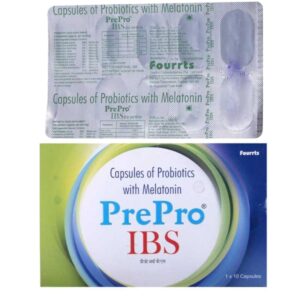MELATONIN + PROBIOTIC
Melatonin: Melatonin is a hormone that is naturally produced by the pineal gland in the brain. It plays a crucial role in regulating the sleep-wake cycle and is often referred to as the “sleep hormone”. However, melatonin is also available as a synthetic supplement and is commonly used to treat sleep disorders.
The primary use of melatonin is to help regulate sleep patterns in individuals with insomnia or other sleep disorders. It is also sometimes used to help alleviate jet lag symptoms and to improve sleep in shift workers who have irregular sleep schedules. In addition, it is sometimes used to treat certain conditions such as seasonal affective disorder (SAD) and cluster headaches.
The exact mechanism of action of melatonin is not fully understood, but it is believed to work by signaling the body that it is time to sleep. Melatonin levels rise in the evening, promoting relaxation and preparing the body for sleep. By taking melatonin as a supplement, it is thought to help regulate and improve sleep patterns.
The recommended dose of melatonin can vary depending on the individual and the specific sleep disorder being treated. In adults, typical doses range from 1 to 10mg, taken approximately 30 minutes to an hour before bedtime. It is important to start with a low dose and gradually increase if needed, as higher doses may not be more effective and can potentially cause side effects.
Most people tolerate melatonin well, but there are some potential side effects to be aware of. Common side effects include drowsiness, dizziness, headache, and stomach discomfort. Some individuals may also experience vivid dreams, nightmares, or changes in mood. It is worth noting that melatonin can interact with certain medications, so it is important to consult with a healthcare professional before starting treatment.
Overall, melatonin is a widely used supplement for sleep regulation and is generally considered safe when used appropriately. However, it is always advisable to discuss its use with a healthcare provider to ensure its suitability for individual needs and to minimize potential risks and interactions.
Probiotic: Drug Name: Probiotic
Description: Probiotics are living microorganisms, specifically beneficial bacteria, that are ingested to provide health benefits. They are commonly found in foods like yogurt, kefir, and fermented vegetables. Probiotic supplements are available in the form of capsules, tablets, and powders.
Use: Probiotics are primarily used to maintain or restore the natural balance of bacteria in the digestive system. They are often recommended to support healthy digestion, boost the immune system, and improve overall gut health. Probiotics are also sometimes used to prevent or treat certain digestive disorders, such as diarrhea, irritable bowel syndrome (IBS), and inflammatory bowel disease (IBD).
Mechanism of Action: Probiotics work by colonizing the intestines with beneficial bacteria. These bacteria can produce enzymes that aid in the digestion and absorption of nutrients. Probiotics also compete with harmful bacteria for space and resources, helping to prevent the overgrowth of pathogens. Furthermore, they can stimulate the production of antimicrobial substances, strengthen the intestinal barrier, and modulate the immune system.
Dose: The dosage of probiotics can vary depending on the specific product and the condition being treated. It is important to follow the instructions provided by the manufacturer or healthcare provider. Probiotics are available in different strengths, typically ranging from 1 to 100 billion colony-forming units (CFUs). Higher CFU counts are often recommended for more severe or chronic conditions. The dose may also be adjusted based on age, health status, and individual response.
Side Effects: Probiotics are generally considered safe and well-tolerated, but some individuals may experience mild side effects, including gas, bloating, and stomach upset. These symptoms are often temporary and resolve on their own as the body adjusts to the probiotics. In rare cases, individuals with weakened immune systems, critically ill patients, or those with certain medical conditions may develop serious infections from specific strains of probiotics. It is advisable to consult a healthcare professional before starting probiotic supplementation, especially if you have any underlying health concerns.

